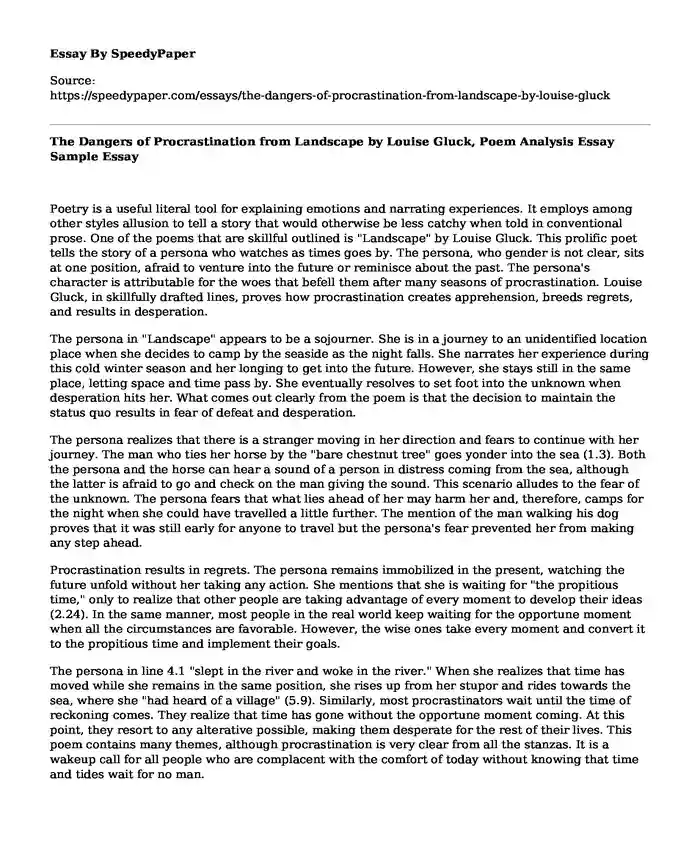Poetry is a useful literal tool for explaining emotions and narrating experiences. It employs among other styles allusion to tell a story that would otherwise be less catchy when told in conventional prose. One of the poems that are skillful outlined is "Landscape" by Louise Gluck. This prolific poet tells the story of a persona who watches as times goes by. The persona, who gender is not clear, sits at one position, afraid to venture into the future or reminisce about the past. The persona's character is attributable for the woes that befell them after many seasons of procrastination. Louise Gluck, in skillfully drafted lines, proves how procrastination creates apprehension, breeds regrets, and results in desperation.
The persona in "Landscape" appears to be a sojourner. She is in a journey to an unidentified location place when she decides to camp by the seaside as the night falls. She narrates her experience during this cold winter season and her longing to get into the future. However, she stays still in the same place, letting space and time pass by. She eventually resolves to set foot into the unknown when desperation hits her. What comes out clearly from the poem is that the decision to maintain the status quo results in fear of defeat and desperation.
The persona realizes that there is a stranger moving in her direction and fears to continue with her journey. The man who ties her horse by the "bare chestnut tree" goes yonder into the sea (1.3). Both the persona and the horse can hear a sound of a person in distress coming from the sea, although the latter is afraid to go and check on the man giving the sound. This scenario alludes to the fear of the unknown. The persona fears that what lies ahead of her may harm her and, therefore, camps for the night when she could have travelled a little further. The mention of the man walking his dog proves that it was still early for anyone to travel but the persona's fear prevented her from making any step ahead.
Procrastination results in regrets. The persona remains immobilized in the present, watching the future unfold without her taking any action. She mentions that she is waiting for "the propitious time," only to realize that other people are taking advantage of every moment to develop their ideas (2.24). In the same manner, most people in the real world keep waiting for the opportune moment when all the circumstances are favorable. However, the wise ones take every moment and convert it to the propitious time and implement their goals.
The persona in line 4.1 "slept in the river and woke in the river." When she realizes that time has moved while she remains in the same position, she rises up from her stupor and rides towards the sea, where she "had heard of a village" (5.9). Similarly, most procrastinators wait until the time of reckoning comes. They realize that time has gone without the opportune moment coming. At this point, they resort to any alterative possible, making them desperate for the rest of their lives. This poem contains many themes, although procrastination is very clear from all the stanzas. It is a wakeup call for all people who are complacent with the comfort of today without knowing that time and tides wait for no man.
Cite this page
The Dangers of Procrastination from Landscape by Louise Gluck, Poem Analysis Essay Sample. (2022, Mar 30). Retrieved from https://speedypaper.net/essays/the-dangers-of-procrastination-from-landscape-by-louise-gluck
Request Removal
If you are the original author of this essay and no longer wish to have it published on the SpeedyPaper website, please click below to request its removal:
- Community Service for Graduation, Free Essay in Education
- Effects of Social Media on Teenage Kids, Free Essay Example
- Free Essay Sample on Effects of War
- Essay Example on Conceptualizations of Hegemony and Habitus
- Essay Sample: The Business Environment and Culture of Mexico
- Preventing Readmissions. Free Essay Example
- Adverse Childhood Experiences. Essay Sample
Popular categories





